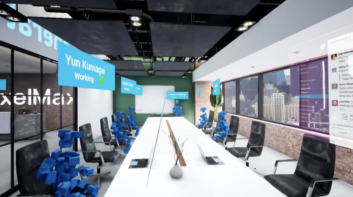British tech innovators PixelMax has warned that Britain’s biggest employers face an exodus of talent this year if they do not empower their employees and adapt to a rapidly changing workplace landscape by leveraging virtual technology, following a survey concluding that 82% of employees want a hybrid working model.
 PixelMax believes that the virtual workplace is the solution to stemming the ‘big resignation’ flow, following a recent report commissioned by London- and Manchester-based leading tech recruitment firm Burns Sheehan indicating that only 4% of employees want to return to the office full time and 82% of employees want a hybrid model, with 59% ranking a work from home flexibility as the No.1 choice in employee benefits. Burns Sheehan developed the report by collating data points from over 50 clients and technology leaders with regards to their hiring over the previous 6 months, beginning in September 2020.
PixelMax believes that the virtual workplace is the solution to stemming the ‘big resignation’ flow, following a recent report commissioned by London- and Manchester-based leading tech recruitment firm Burns Sheehan indicating that only 4% of employees want to return to the office full time and 82% of employees want a hybrid model, with 59% ranking a work from home flexibility as the No.1 choice in employee benefits. Burns Sheehan developed the report by collating data points from over 50 clients and technology leaders with regards to their hiring over the previous 6 months, beginning in September 2020.
“Remote working enabled many companies to resume a degree of normality during the lockdown periods, equally, there was a price to pay with regards to employees’ well-being and mental health,” said Rob Hilton CEO and co-founder of PixelMax. “The Big Resignation is all about employees voting with their feet and making the shift change, choosing who they want to work for, how they want to work and when they want to work. In order for business and industry to retain the best talent, they need to rethink the workplace environment. It needs to reflect a modern hybrid of the office and remote working from any location but interconnected within a platform that is engaging to all employees and makes them feel connected to their work colleagues, whether that be in the physical sense in the office or from their remote location.”
Burns Sheehan co-founder, Jon Sheehan, added:“The tech hiring market has been the busiest Burns Sheehan have ever seen. I’ve never seen anything like this in the market before; most candidates will have four to five job opportunities and firm job offers on the go within 24 hours. This isn’t even about bigger salaries; that’s just a side perk. Employees are much more focussed on their work-life balance and wider aspirations in the working environment.
“This is very much an employees’ market, driven by employees calling the shots. Many are opting for a virtual workplace model, where they have the option to work from home and the office of their choosing, but also still to remain connected to the office environment even whilst working remotely. If employers don’t embrace this new model of working, then the ones who have adapted quickly to change will have the commercial advantage of hiring and retaining the best talent.”
PixelMax immediately saw this disconnect between employers and employees and their workplace environment at the start of the pandemic and tackled the issue head-on. The Manchester company was one of the first British tech outfits to pivot their 3D immersive technology in the early days of the pandemic to create unique virtual workplace platforms and environments for companies.
“The software PixelMax have developed aims to separate the work from home environment but maintain the engagement and immersive nature of being in the physical office with colleagues,” explained Shay O’Carroll, co-founder of PixelMax. “It means we create an experience – regardless of your location – where you walk into the virtual office each morning, have spontaneous conversations with colleagues rather than logging straight onto Teams or Zoom. Employees can wander through the virtual office with their own uniquely created avatars, see messages and engage in meetings with their work colleagues. The virtual office creates presence and also an atmosphere / buzz that doesn’t exist in 2D video conferencing platforms. They can even walk over to the Costa point and order a coffee to be delivered to their physical location.
The virtual workplace encourages a positive culture. Employees can take part in wellness challenges, do workouts, meditate and relax with minigames. Previously, businesses might have offered gym memberships. Now, they could offer an online fitness subscription or a smartwatch. Company cultures are evolving, and they will continue to evolve until the end of time. What’s important right now is for business leaders to understand that it is the turn of the employee to dictate how and when they want to work. This business evolution is a collaborative process now and listening to your employees’ wants and needs has never been more important. Investing in employees is how cultures should evolve into something positive and beneficial for the business and employees.”







